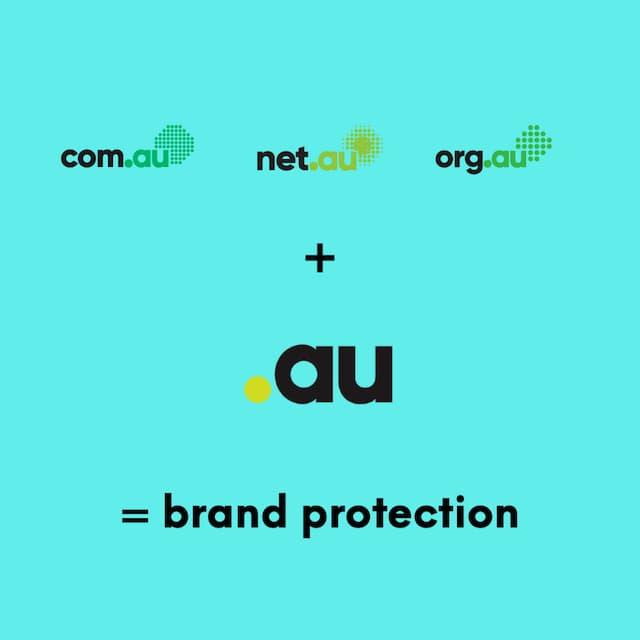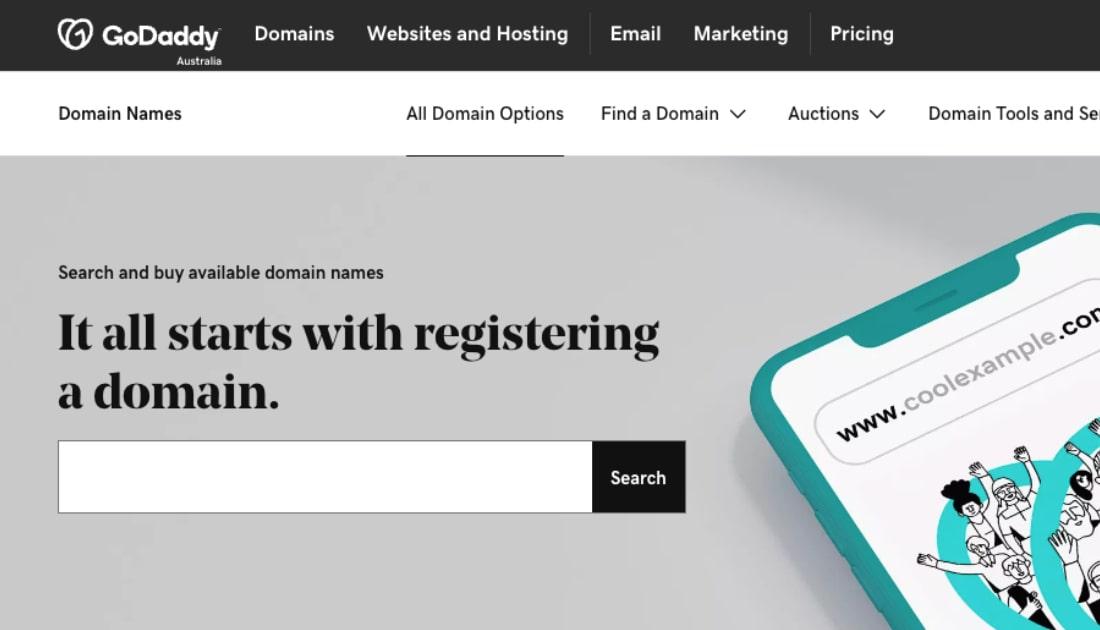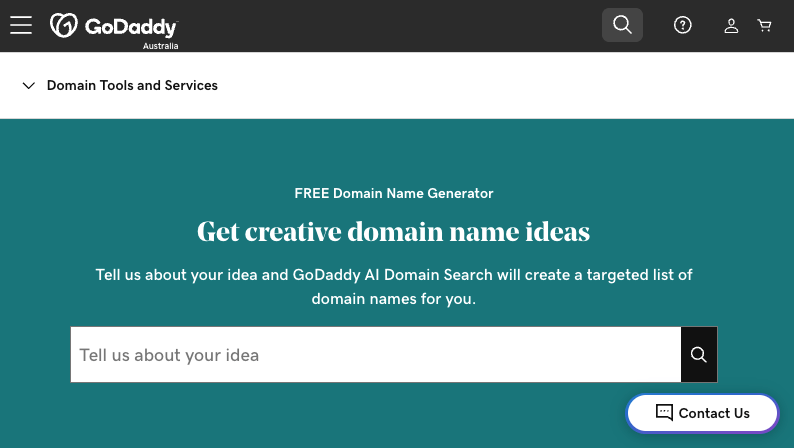When looking for a domain name for your business, personal blog, or portfolio website, there are a few important things to consider.
First, look for a domain that’s easy for people to digest and doesn’t have misspellings, numbers or hyphens.
Second, search for domain names that reflect your brand, whether that means including your name, slogan or keywords associated with your target market.
Last but not least, think critically about what domain extension or ending makes the most sense for your specific needs. With this one, it helps to know the five most popular domain names.
A domain extension is the letters that follow the dot in a web address.
It’s used to provide a clue to the nature of the business or, in some cases, its location.
For instance, in GoDaddy.com, .com is the domain extension. Dot com is widely associated with commercial businesses.
What are some of the most popular domain endings?
Choosing a recognizable domain extension could help with your online business branding. Here are five of the most common domain extensions to consider if you’re based in Australia:
- .com
- .com.au
- .net
- .org
- .co
Let’s explore these five popular domain extensions and explain why you should consider each one for your new domain.
Note: Don't like any of those? There are plenty more domain extensions to choose from, including location-specific extensions like .melbourne and .sydney. If money matters, you may want to explore cheaper domain alternatives.
1. .com

.com is hands-down the most popular top-level domain (TLD). It was originally used to designate for-profit businesses, but has now become the mainstay of domain extensions.
When deciding on a domain extension, you should consider strongly the .com version if it’s available.
If they don't know your web address, most people will guess .com.
Humans are creatures of habit. Many of us have spent the past decade or more typing web addresses with .com extensions into our browsers.
We are very familiar with this extension and almost expect it when hearing new domain names.
So, it can make sense to buy the .com version of any domain name you own for pure brand recognition alone. This will also keep copycats from registering the .com version of your business web address and using it to pull traffic away from your website.
The pros to picking .com are apparent, but there are also some cons. The main reason you wouldn’t pick .com for your new website is you may not be able to get the address you want.
When the internet and web development first took off, many entrepreneurs purchased domain names to flip them for a profit. If your .com has already been registered, you might have to pay a pretty penny to purchase it from the current owner.
Which is to say that if you have the opportunity to get a .com, you should strongly consider buying it. In case the desired .com domain is already taken, you can use GoDaddy's free domain lookup tool to find who owns it. This will give you the info you need to contact the owner and ask about buying the domain.
Not good with negotiation? Let the experts at GoDaddy contact the owner of any domain to see if they are willing to sell (and for how much).
If you can’t find a good .com, or don’t want to invest a lot of money to purchase the rights, you can take a look at other options.
2. .com.au
If your business is based in Australia, then a .com.au domain extension should also be on your short list.

Location-specific domain endings are a great way to show customers that you’re based here and your site lists prices in Australian dollars.
Of course, if you’re looking to attract customers from across the globe a location-specific domain name may not be the right choice.
But don’t forget, you can always purchase your domain on more than one extension and use each to target your website to a different audience.
3. .net
Much like the .com extension, .net extensions are open to anyone. What was originally intended for internet service providers (ISPs) or networks has become a great alternative to .com.
This might be a nice option for tech- or application-based companies because it implies network and technology.
If your business operates in those industries, .net makes perfect sense and can help communicate your services.
In addition, .net is in less demand than .com, so it's more likely that your desired domain will be available.
Because many people associate .net with technology, businesses that operate outside the tech or web-service spaces but use this domain extension could confuse customers.
For example, if you operate a baking business and wanted a .net domain for your website, you might think Cookies.net would be perfect.
People might think your business provides a service for web cookies rather than edible baked goods.
This disconnect could keep people from coming to your site and confuse those who do land on it.
One brand using .net effectively is SourceForge.net. They are a web-based service that provides an online community for people who need help with open-source web projects. It’s a collaborative community focused on networking and technology-based businesses.
SourceForge understands what their .net domain extension says about them. They've used it to their advantage to grow their credibility and community within the IT space.
4. .org
The .org extension is also open to any person or entity, even though it was originally designed to represent not-for-profit organizations.
It’s a popular option for many non-governmental organizations, non-profits, politicians and political parties, and online communities.

.org is less popular than .com, which means you have a good chance to acquire your perfect domain. These are just two of the reasons .org domains are some of the most popular on the web.
However, .org might make sense if you operate a not-for-profit or information-driven business, but it doesn’t make sense for everyone. For instance, many people associate .org with communities and knowledge bases, so if you operate an eCommerce store and simply try to convert all your traffic into sales, .org wouldn’t be the best choice.
The websites that do the best using .org focus on building communities.
For instance, Wikipedia, Craigslist and WordPress are all brands that use .org for their web addresses. They all provide different services, but rely on their communities to grow their brands and share knowledge and information.
5. .co
The .co extension is an interesting option if you’re looking for something a bit different or can't find the domain name you want with .com.
It was originally designated the country code domain ending for Colombia, but has become a popular domain extension for global businesses.
"Co" is a familiar acronym for company, corporations or commercial ventures. This familiarity has led many forward-thinking businesses to build their websites on .co domain extensions.
Creating a website with .co makes sense if you are a business, particularly if you’re a young startup that markets itself as original or unique.
You might also consider registering a .co extension because of its domain availability. As mentioned previously, premium .com domains are rarely available. And if they are, you’ll have to pay more than you might like.
However, .co domains may be less sought after, which gives you more options.
Other domain extension options
The domain extensions above are a great place to start, but they aren’t your only options. In fact, there are more than 1,500 different TLDs available in addition to the five most common ones above.
Below are some other popular options:
- .app —Great for tech businesses
- .shop —Offers an obvious ecommerce connection
- .info —An open extension that is short for information
- .xyz —An open extension available for general use
- .biz —A straightforward extension aimed at businesses of all kinds
There are a lot of considerations that go into picking out the perfect domain name. In addition to finding a name that reflects your personal or brand identity — and is easy to remember and type — you must also make sure the domain extension matches your business.
You can learn more about choosing a domain name in this guide.








